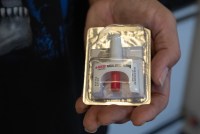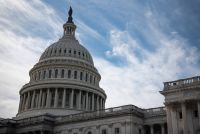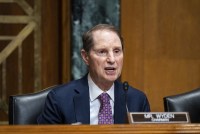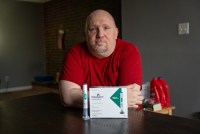Latest KFF Health News Stories
The Powerful Constraints on Medical Care in Catholic Hospitals Across America
The expansion of Catholic hospitals nationwide leaves patients at the mercy of the church’s religious directives, which are often at odds with accepted medical standards.
What the Health? From KFF Health News: Biden Wins Early Court Test for Medicare Drug Negotiations
A federal district court judge dismissed a lawsuit attempting to invalidate the Biden administration’s Medicare prescription-drug price negotiation program. But the suit turned on a technicality, and several more court challenges are in the pipeline. Meanwhile, health policy pops up in Super Bowl ads, as Congress approaches yet another funding deadline. Alice Miranda Ollstein of Politico, Lauren Weber of The Washington Post, and Rachel Cohrs of Stat join KFF Health News’ Julie Rovner to discuss these issues and more. Plus, for “extra credit,” the panelists suggest health policy stories they read this week they think you should read, too.
Early Detection May Help Kentucky Tamp Down Its Lung Cancer Crisis
After a decade of work, a Kentucky program launched to diagnose lung cancer earlier is beginning to change the prognosis for residents by catching tumors when they’re more treatable.
New Eligibility Rules Are a Financial Salve for Nearly 2 Million on Medi-Cal
Nearly 2 million Medi-Cal enrollees, mainly people who are aged, disabled, or in long-term care, can now accumulate savings and property without limitations and still qualify for the state’s health insurance program for low-income residents. They join an additional roughly 12 million enrollees who already had no asset limits.
Watch: The Feds Reexamine Covid Protocols. Here’s Why You Should Care.
KFF Health News’ Céline Gounder explains the “five-day rule” on covid safety, how guidelines and testing have evolved, and how best to protect yourself and others.
California Prison Drug Overdoses Surge Again After Early Treatment Success
Drug overdose deaths in California state prisons rebounded to near record levels last year, a big setback for corrections officials who thought they were on the right track with medication-assisted treatment efforts. Prison officials and attorneys representing prisoners blame fentanyl.
For the Love of Health Care and Health Policy
KFF Health News shares the crème de la crème of reader-submitted health policy valentines. Two of our favorites melted our hearts and inspired original illustrations.
In Fight Over Medicare Payments, the Hospital Lobby Shows Its Strength
Medicare pays hospitals about double what it pays other providers for the same services. The hospital lobby is fighting hard to make sure a switch to “site-neutral payments” doesn’t become law.
‘Behind the Times’: Washington Tries to Catch Up With AI’s Use in Health Care
Lawmakers and regulators are trying to understand how AI is changing health care and how it should be regulated. The industry fears overreach.
States Target Health Insurers’ ‘Prior Authorization’ Red Tape
Doctors, patients, and hospitals have railed for years about the prior authorization processes that health insurers use to decide whether they’ll pay for patients’ drugs or medical procedures. The Biden administration announced a crackdown in January, but some state lawmakers are looking to go further.
GoFundMe Has Become a Health Care Utility
Resorting to crowdfunding to pay medical bills has become so routine, in some cases health professionals recommend it.
Do We Simply Not Care About Old People?
Recently, thousands of older Americans have been dying weekly of covid. But most Americans aren’t wearing masks in public, a move that could prevent infections. Many at-risk seniors aren’t getting antiviral therapies, and older adults in nursing homes aren’t getting vaccines. Why?
For the first time, a jury has convicted a parent of a school shooter of charges related to the child’s crime, finding a mother in Michigan guilty of involuntary manslaughter and possibly opening a new legal avenue for gun control advocates. Meanwhile, as the Supreme Court prepares to hear a case challenging the FDA’s approval of the abortion drug mifepristone, a medical publisher has retracted some of the journal studies that lower-court judges relied on in their decisions. Alice Miranda Ollstein of Politico, Sarah Karlin-Smith of the Pink Sheet, and Rachana Pradhan of KFF Health News join KFF Health News’ Julie Rovner to discuss these issues and more. Plus, for “extra credit,” the panelists suggest health policy stories they read this week that they think you should read, too.
FDA’s Plan to Ban Hair Relaxer Chemical Called Too Little, Too Late
The FDA’s recent notice that it would move to ban formaldehyde in hair-straightening products comes more than a decade after researchers raised alarms about health risks. Scientists say a ban would still leave many dangerous chemicals in hair straighteners.
Cities Know That the Way Police Respond to Mental Crisis Calls Must Change. But How?
Cities are experimenting with new ways to meet the rapidly increasing demand for behavioral health crisis intervention, at a time when incidents of police shooting and killing people in mental health crisis have become painfully familiar.
Colorado Moves to Connect Agricultural Workers With Mental Health Resources
Advocates say two bills under consideration could help migrant communities but that more needs to be done.
Halfway Through ‘Unwinding,’ Medicaid Enrollment Is Down About 10 Million
While more Medicaid beneficiaries have been purged in the span of a year than ever before, enrollment is on track to settle at pre-pandemic levels.
Back From COP28, California Climate Leaders Talk Health Impacts of Warming
Three leading California officials who represented the state at the United Nations climate talks late last year reflect on climate change’s growing threat to human health — and explain what the state is trying to do about it.
Congressman Off-Base in Ad Claiming Fauci Shipped Covid to Montana Before the Pandemic
Facts don’t support claims by a likely Republican Senate candidate that a federal research laboratory in Montana infected bats with a coronavirus from China before the covid-19 outbreak.
Advocates Say a Practice Harms Disabled Children, Yet Congressional Action Is Stalled
In the photos, a 9-year-old boy with autism appears barricaded between cubbies and furniture stacked near the walls of a North Carolina classroom. His mother, Erin McGrail, said her son was physically restrained at least 14 times while in third grade at Morrisville Elementary School. She said she learned details of his seclusion only after […]

























